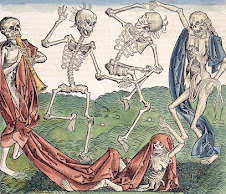Thursday, February 14, 2008
Omitted for a reason?
Chapter 34 from page 228 was omitted and later replaced back into the text. Why? My thought is that the story is a delicate issue... the questionability of everyday miracles. A boy thought it of importance to pray for a miracle to keep the grain dry from the gathering storm, and God seemingly gave him such a miracle by offering a patch of clear sky above the grain. The priests had the boy beaten for basically "wasting God's magic." There are a few problems with this that I can gather right from the start:
1. We are under the assumption at this point in history that there is no question of God's existence. Therefore God had a reason to spare the grain. In punishing the boy who prayed to God, the priests seem to be undercutting and undermining God's intentions and powers, which seems like a hypocritical backwards step in judgment. When every argument is overruled by "god has his reasons," why is this not applicable to priests?
2. Perhaps the priests saw this NOT as an act of God, but of a mere coincidence. It could be interpreted from the passage that the boy was given punishment for constantly relying on "prodigies and miracles," instead of exhibiting some self responsibility. But again, another self destructive hypothesis that doesn't match that of Christianity.
I feel as if contradictory examples such as this help to exploit some of the inconsistencies in religion throughout history. It will be interesting to see how specific Christian idiosyncracies develop through further readings and sources.
1. We are under the assumption at this point in history that there is no question of God's existence. Therefore God had a reason to spare the grain. In punishing the boy who prayed to God, the priests seem to be undercutting and undermining God's intentions and powers, which seems like a hypocritical backwards step in judgment. When every argument is overruled by "god has his reasons," why is this not applicable to priests?
2. Perhaps the priests saw this NOT as an act of God, but of a mere coincidence. It could be interpreted from the passage that the boy was given punishment for constantly relying on "prodigies and miracles," instead of exhibiting some self responsibility. But again, another self destructive hypothesis that doesn't match that of Christianity.
I feel as if contradictory examples such as this help to exploit some of the inconsistencies in religion throughout history. It will be interesting to see how specific Christian idiosyncracies develop through further readings and sources.
Subscribe to:
Post Comments (Atom)

No comments:
Post a Comment